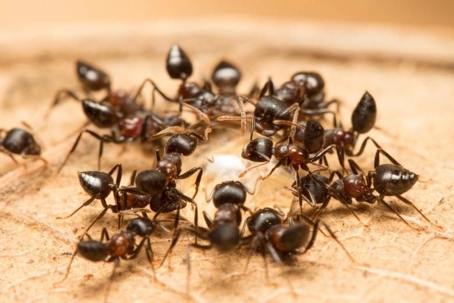What Can Acrobat Ants Eat?
Acrobat ants (genus Crematogaster) are opportunistic feeders with a highly varied diet, which allows them to thrive in many environments. The diet of these ants can be categorized as follows:
Sugary substances: Acrobat ants are particularly attracted to sweet liquids, such as honeydew (produced by aphids and other sap-sucking insects), nectar from flowers, and sugary foods found in homes like syrup, soda, or fruit juice. Sugars provide a quick energy source for their active lifestyle.
Proteins: Acrobat ants consume protein to support colony growth and brood development. This includes dead or live insects, small arthropods, and insect larvae. They may also scavenge meat or other protein-rich food sources when available.
Fats: While not their primary preference, they will feed on fatty foods if present, especially in human environments.
Plant materials: Occasionally, they may feed on pollen or plant exudates, though this is less common compared to sugars and proteins.
Honeydew-harvesting behavior: Acrobat ants often protect and farm aphids or scale insects to obtain a steady supply of honeydew, showing their opportunistic and strategic feeding habits.
Acrobat ants are highly adaptable, consuming whatever nutrient sources are available to sustain both worker ants and the colony’s brood. In homes, this typically means sugary and protein-rich foods, while in nature, their diet leans more heavily on insects and honeydew.
What Do Acrobat Ants Eat?
Acrobat ants most commonly prefer sweet substances as their primary food source. They are particularly attracted to:
Honeydew: Produced by aphids, scale insects, and other sap-sucking pests. Acrobat ants often farm these insects to maintain a steady supply.
Nectar: From flowers in outdoor environments.
Sugary foods in homes: Syrups, soda, fruit juice, honey, and other sugary residues.
While they do consume proteins like dead insects or small arthropods, sugars are their main preference, especially for energy to sustain the colony’s activity. Protein sources are more important for feeding larvae and supporting colony growth, but the ants’ foraging behavior is largely driven by their search for sweet liquids.
Do Acrobat Ants Eat Insects?
Yes, acrobat ants do eat insects, but this usually plays a secondary role in their diet compared to sugary foods. They will hunt or scavenge small arthropods, insect larvae, or dead insects to obtain protein, which is essential for feeding their brood (larvae and pupae) and supporting colony growth.
In nature, acrobat ants are opportunistic predators and scavengers: they may attack soft-bodied insects or feed on insects trapped in or near their nest. However, when given a choice, they typically prioritize sweet substances like honeydew or nectar for immediate energy.
In human environments, this means they might consume insects if available, but they are more often attracted to sugary foods or sticky residues.
Do Acrobat Ants Eat Animals?
Acrobat ants do not eat “animals” in the sense of large vertebrates, but they do consume small animals in the form of insects and other arthropods. These provide the protein necessary for brood development and colony growth. So while they are opportunistic predators and scavengers, their “animal diet” is limited to very small creatures like:
Dead or live insects (e.g., flies, caterpillars, or other soft-bodied insects)
Insect larvae
They do not hunt or feed on larger animals like mammals, birds, or reptiles. Their predation is mostly opportunistic rather than aggressive—they take what is available and manageable for their size.
Their diet is primarily sugary substances, with animal protein acting as a supplemental nutrient source.
Do Acrobat Ants Eat Plants?
Yes, acrobat ants do eat certain plant-derived materials, but plants are not their primary food source. Their plant-based diet mainly includes:
Nectar: From flowers, which provides sugar for energy.
Honeydew: A sugary secretion from aphids and other sap-sucking insects, often collected directly from the insects they “farm.”
Occasional plant exudates or sap: Some acrobat ants may feed on soft, sugary plant juices when available.
They do not typically consume leaves, stems, or roots in the way herbivorous insects do. Their plant-based feeding is mostly for sugars and energy rather than structural plant material.
Sugary plant secretions are attractive to them, but they still rely heavily on insects for protein and other nutrients.

